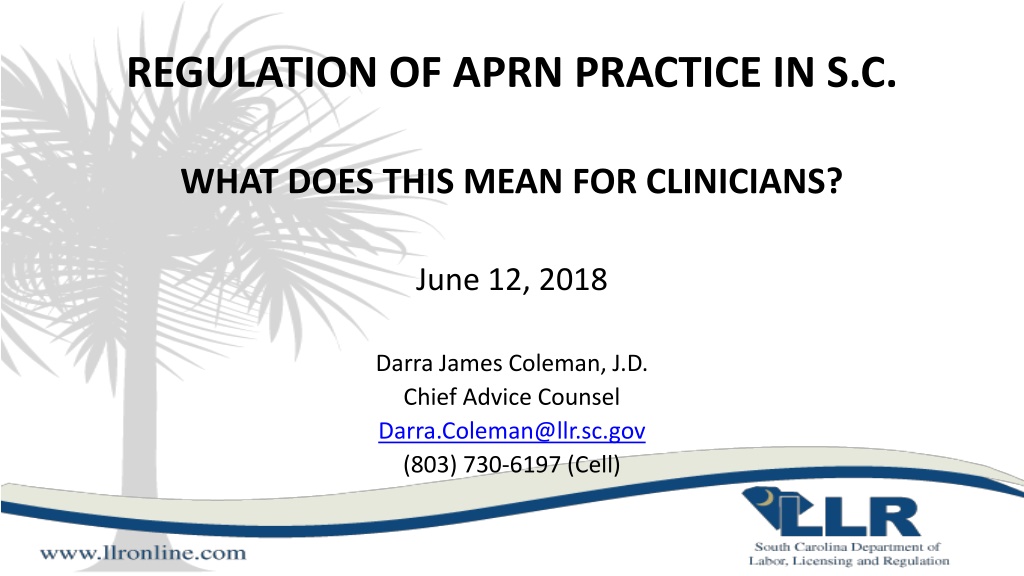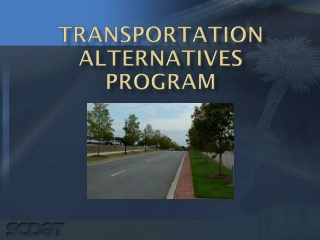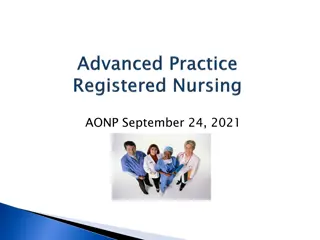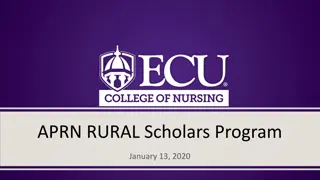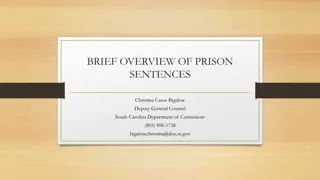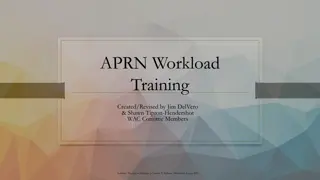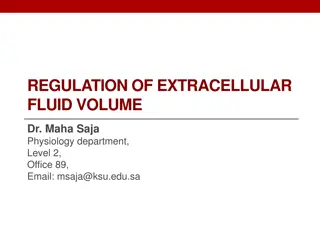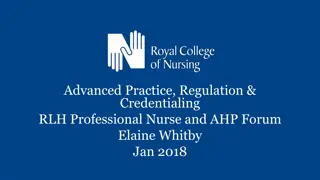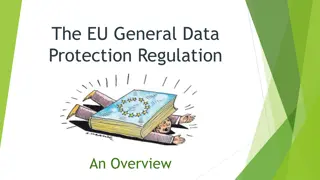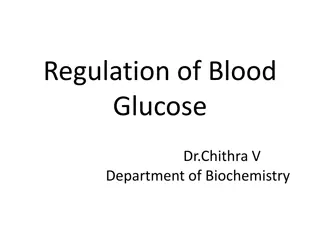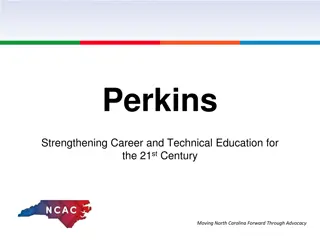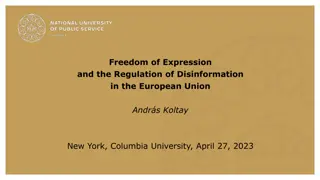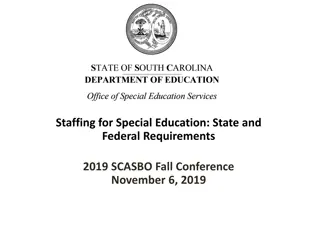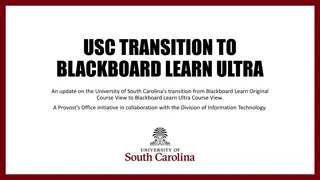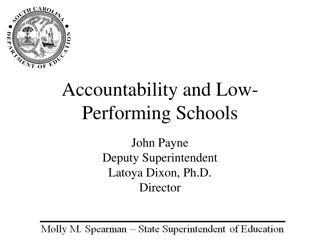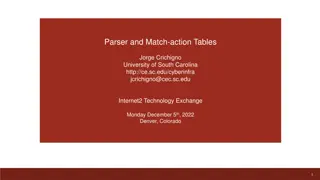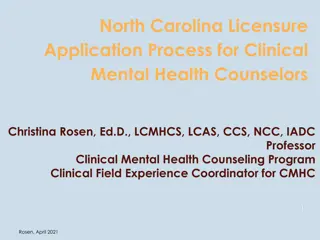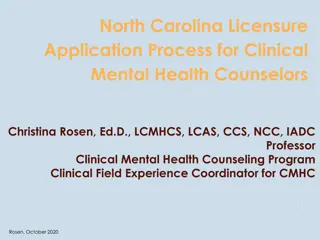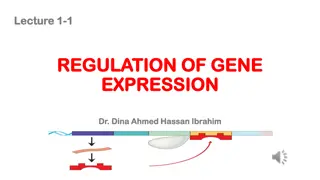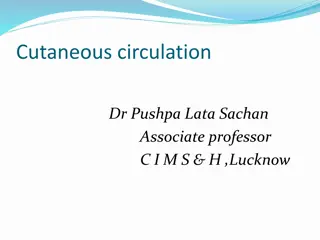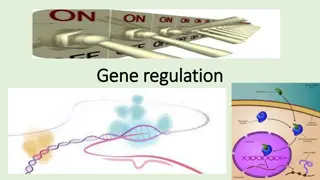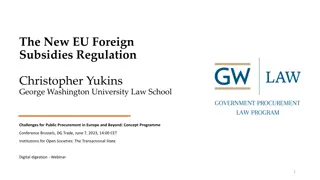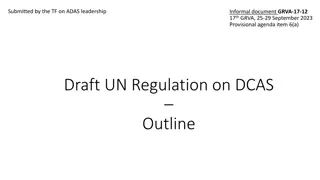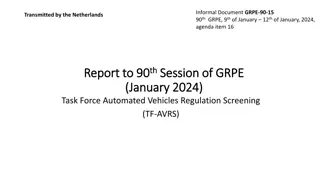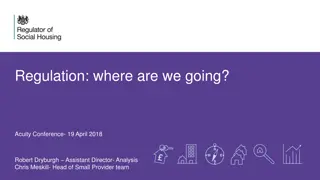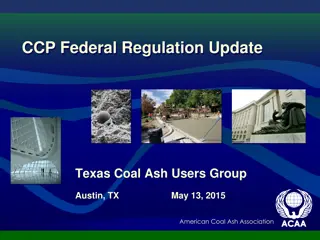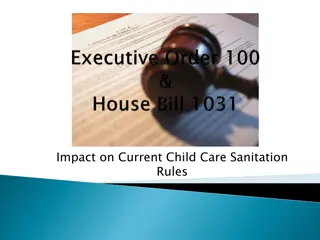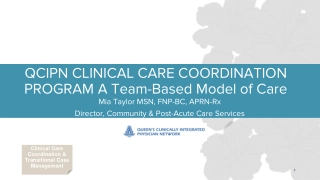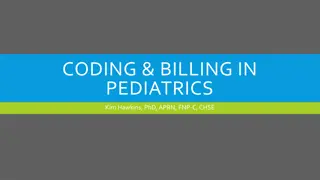Understanding the Impact of APRN Regulation in South Carolina
The new legislation signed into law in South Carolina, R. 203, S. 345, effective from July 1, 2018, significantly affects the practice of every APRN in the state, apart from CRNAs. The law introduces the concept of a practice agreement, replacing the old protocol requirement, offering a more flexible framework for collaboration between APRNs and physicians or medical staff. This agreement outlines the medical care to be provided by APRNs and ensures compliance with state and federal laws, nursing and medical board regulations. The legislation aims to enhance patient safety and quality of care by defining clear responsibilities and mechanisms for collaboration in various clinical settings.
Download Presentation

Please find below an Image/Link to download the presentation.
The content on the website is provided AS IS for your information and personal use only. It may not be sold, licensed, or shared on other websites without obtaining consent from the author. Download presentation by click this link. If you encounter any issues during the download, it is possible that the publisher has removed the file from their server.
E N D
Presentation Transcript
REGULATION OF APRN PRACTICE IN S.C. WHAT DOES THIS MEAN FOR CLINICIANS? June 12, 2018 Darra James Coleman, J.D. Chief Advice Counsel Darra.Coleman@llr.sc.gov (803) 730-6197 (Cell)
R. 203, S. 345 Signed into law on May 18, 2018 Effective on July 1, 2018 Impacts EVERY APRN practicing in South Carolina, regardless of clinical setting or designation as certified nurse midwife (CNM), clinical nurse specialist (CNS), or nurse practitioner (NP), EXCEPT certified registered nurse anesthetist (CRNA). CRNA practice will continue under the prior law.
Definitions SC Code Ann. 40-33-20 is significantly revised (36) 'Medical staff' means licensed physicians who are approved and credentialed to provide health care to patients in a hospital system or a facility that provides health care. (44) 'Physician' means a physician licensed by the South Carolina Board of Medical Examiners who possesses an active, unrestricted, permanent license to practice medicine in this State and who actively is practicing within the geographic boundaries of this State.
Practice Agreement The legislation deletes several definitions from the old nurse practice act, including approved written protocol and replaces the protocol with a practice agreement. Practice agreement is a statutorily defined term of art, but is intended to be a highly flexible tool that can be tailored to reflect the unique dynamics of the clinical setting that exists between a particular APRN and collaborating physician.
Definition of Practice Agreement 40-33-20(45): 'Practice agreement' means a written agreement developed by an NP, CNM, or CNS and a physician or medical staff who agrees to work with and to support the NP, CNM, or CNS. The practice agreement must establish the medical aspects of care to be provided by the NP, CNM, or CNS, including the prescribing of medications. The practice agreement must contain mechanisms that allow the physician to ensure that quality of clinical care and patient safety is maintained in accordance with state and federal laws, as well as all applicable Board of Nursing and Board of Medical Examiners rules and regulations. The practice agreement must comply with Section 40-33-34. A CNM also may practice pursuant to written policies and procedures for practice developed and agreed to with a physician who is board certified or board eligible by the American College of Obstetricians and Gynecologists. Written policies and procedures constitute a practice agreement for purposes of compliance with Section 40-33-34 and must address medical aspects of care including prescriptive authority and must contain transfer policies and details of the on-call agreement with the physician with whom the policies and procedures were developed and agreed. The on-call physician has the authority to designate another qualified physician to be the on-call physician if necessary. The on-call physician must be available to the CNM to provide medical assistance in person, by telecommunications, or by other electronic means.
New Definition of Readily Available 40-33-20(52) 'Readily available' means the physician or medical staff who enters into a practice agreement with an NP, CNM, or CNS must be able to be contacted either in person or by telecommunications or other electronic means to provide consultation and advice to the NP, CNM, or CNS performing medical acts. * This revised definition deletes the ratio restriction of 3 APRNs and mileage restriction of 45 miles.
Underserved Area and Population (61) 'Underserved or rural area' means an area determined by a federal or state agency authorized to determine such a designation. (62) 'Underserved population' means a population residing in a rural or urban area, which includes, but is not limited to: (a) persons receiving Medicaid, Medicare, Department of Health and Environmental Health care, or free clinic care; (b) those residing in long-term care settings or receiving care from a licensed hospice; (c) those in institutions including, but not limited to, incarceration institutions and mental health institutions; and (d) persons including, but not limited to, the homeless, HIV patients, children, women, the economically disadvantaged, the uninsured, the underinsured, the developmentally disabled, the medically fragile, the mentally ill, migrants, military persons and their dependents, and veterans and their dependents.
Revisions to 40-33-34 40-33-34 (C): A licensed nurse practitioner, certified nurse-midwife, or clinical nurse specialist must provide evidence of a practice agreement, as provided in this section. A licensed NP, CNM, or CNS must spend a portion of his time practicing in an underserved or rural area or serving an underserved population as defined in Section 40-33-20. A licensed NP, CNM, or CNS performing medical acts must do so pursuant to a practice agreement with a physician who must be readily available for consultation. Regulatory challenge: Portion of time is an undefined metric. Possible solution: Addition of an affirmation of compliance on renewal application.
Revisions to 40-33-34 (D)(1) Medical acts performed by a nurse practitioner or clinical nurse specialist must be performed pursuant to a practice agreement between the nurse and the physician or medical staff. The practice agreement must include, but is not limited to: (a) the following general information: (i) name, address, and South Carolina license number of the nurse; (ii) name, address, and South Carolina license number of the physician; (iii) nature of practice and practice locations of the nurse and physician; (iv) date the practice agreement was entered into and dates the practice agreement was reviewed and amended; and (v) description of how consultation with the physician is provided and provision for backup consultation if the physician is unavailable; and (b) the following information for medical acts: (i) medical conditions for which therapies may be initiated, continued, or modified; (ii) treatments that may be initiated, continued, or modified; (iii) drug therapies that may be prescribed; and (iv) situations that require direct evaluation by or referral to the physician.
Revisions to 40-33-34 (D)(2) Notwithstanding any provisions of state law other than this chapter and Chapter 47, and to the extent permitted by federal law, an APRN may perform the following medical acts unless otherwise provided in the practice agreement: (a) provide noncontrolled prescription drugs at an entity that provides free medical care for indigent patients; (b) certify that a student is unable to attend school but may benefit from receiving instruction given in his home or hospital; (c) refer a patient to physical therapy for treatment; (d) pronounce death and sign death certificates; (e) issue an order for a patient to receive appropriate services from a licensed hospice as defined in Chapter 71, Title 44; and (f) certify that an individual is handicapped and declare that the handicap is temporary or permanent for purposes of the individual's application for a placard.
Revisions to 40-33-34 (3) The original practice agreement and any amendments to it must be reviewed at least annually, dated and signed by the nurse and physician, and made available to the board for review within seventy- two hours of request. Failure to produce a practice agreement upon request of the board is considered misconduct and subjects the licensee to disciplinary action. A random audit of a practice agreements must be conducted by the board at least biennially. (4) Licensees who change practice settings or physicians shall notify the board of the change within fifteen business days and provide verification of a practice agreement. NPs, CNMs, and CNSs who discontinue their practice shall notify the board within fifteen business days.
Revisions to 40-33-34 (E)(1) An NP, CNM, or CNS who applies for prescriptive authority: (a) must be licensed by the board as a nurse practitioner, certified nurse-midwife, or clinical nurse specialist; (b) shall submit a completed application on a form provided by the board; (c) shall submit the required fee; (d) shall provide evidence of completion of forty-five contact hours of education in pharmacotherapeutics acceptable to the board, within two years before application or during the time of the organized educational program shall provide evidence of prescriptive authority in another state meeting twenty hours in pharmacotherapeutics acceptable to the board, within two years before application; (e) shall provide at least fifteen hours of education in controlled substances acceptable to the board as part of the twenty hours required for prescriptive authority if the NP, CNM, or CNS has equivalent controlled substance prescribing authority in another state; (f) shall provide at least fifteen hours of education in controlled substances acceptable to the board as part of the forty-five contact hours required for prescriptive authority if the NP, CNM, or CNS initially is applying to prescribe in Schedules II through V controlled substances.
Revisions to 40-33-34 (F)(1) Authorized prescriptions by a nurse practitioner, certified nurse-midwife, or clinical nurse specialist with prescriptive authority: (a) must comply with all applicable state and federal laws and executive orders; (b) is limited to drugs and devices utilized to treat medical problems within the specialty field of the nurse practitioner or clinical nurse specialist as prescribed in the practice agreement; (c) may include Schedules III through V controlled substances if listed in the practice agreement and as authorized by Section 44-53-300; (d) may include Schedule II nonnarcotic substances if listed in the practice agreement and as authorized by Section 44-53-300, provided, however, that each such prescription must not exceed a thirty-day supply; (e) may include Schedule II narcotic substances if listed in the practice agreement and as authorized by Section 44-53-300, provided, however, that the prescription must not exceed a five-day supply and another prescription must not be written without the written agreement of the physician with whom the nurse practitioner, certified nurse-midwife, or clinical nurse specialist has entered into a practice agreement, unless the prescription is written for patients in hospice or palliative care; (f) may include Schedule II narcotic substances for patients in hospice or palliative care if listed in the practice agreement as authorized by Section 44-53-300, provided, however, that each such prescription must not exceed a thirty-day supply; (g) must be signed or electronically submitted by the NP, CNM, or CNS with the prescriber's identification number assigned by the board and all prescribing numbers required by law. Written prescription forms must include the name, address, and phone number of the NP, CNM, or CNS and physician. Electronic prescription forms must include the name, address, and phone number of the NP, CNM, or CNS and, if possible, the physician through the electronic system. All prescriptions must comply with the provisions of Section 39-24-40. A prescription must designate a specific number of refills and may not include a nonspecific refill indication; (h) must be documented in the patient record of the practice and must be available for review and audit purposes.
Revisions to 40-33-34 Re: Telemedicine (I)(1) For purposes of this subsection: (a) 'Telemedicine' has the same meaning as provided in Section 40-47-20(52). (b) 'Unprofessional conduct' has the same meaning as provided in Section 40-33-20(64). (2) An APRN may perform medical acts via telemedicine pursuant to a practice agreement as defined in Section 40-33-20(45). (3) An APRN who establishes a nurse-patient relationship solely by means of telemedicine shall adhere to the same standard of care as a licensee employing more traditional in-person medical care. Failure to conform to the appropriate standard of care is considered unprofessional conduct and may be subject to enforcement by the board. (4) An APRN may not establish a nurse-patient relationship by means of telemedicine for the purpose of prescribing medication when an in-person physical examination is necessary for diagnosis.
Revisions to 40-33-34(I) Re: Telemedicine (5) An APRN who establishes a nurse-patient relationship solely by means of telemedicine only may prescribe within a practice setting fully in compliance with this chapter and during an encounter in which threshold information necessary to make an accurate diagnosis is obtained in a medical history interview conducted by the prescribing licensee; provided, however, that Schedule II-V prescriptions are only permitted pursuant to a practice agreement as defined in Section 40-33-20(45) and nothing in this item may be construed to authorize the prescribing of medications via telemedicine that otherwise are restricted by the limitations in Section 40-47-37(C)(6) unless approved by a joint committee of the Board of Medical Examiners and the Board of Nursing. (6) An APRN who establishes a nurse-patient relationship solely by means of telemedicine shall generate and maintain medical records for each patient using those telemedicine services in compliance with any applicable state and federal laws, rules, and regulations, including the provisions of this chapter, the Health Insurance Portability and Accountability Act (HIPAA), and the Health Information Technology for Economic and Clinical Health Act (HITECH). These records must be accessible to other practitioners and to the patient in a timely fashion when lawfully requested by the patient or his lawfully designated representative. (7) The provisions of this subsection may not be construed to allow an APRN to perform services beyond the scope of what is authorized by Chapter 33, Title 40 and Chapter 47, Title 40."
Critical Facts in the History of APRN Telemedicine The South Carolina Telemedicine Act (June 3, 2016) established practice standards for physicians, including prescriptive limitations, but did not authorize telemedicine for other healthcare professionals. Nothing in the Nurse Practice Act or the Code of Regulations authorized the practice of telemedicine by APRNs.
Critical Facts in the History of APRN Telemedicine The South Carolina Legislature drafted Proviso 117.135 (2017) (C) An Advanced Practice Registered Nurse (APRN), as defined in Section 40- 33-20(5) of the 1976 Code, working in a telehealth program may provide services pursuant to a written protocol approved by the South Carolina Board of Medical Examiners as required by Sections 40-33-34 and 40-47-195 using electronic communications, information technology, or other means to a patient in another location with or without an intervening practitioner. APRNs practicing telehealth will be held to the same standard of care as in- person medical care. Except as provided herein, this shall not be construed to allow an APRN to perform services beyond the scope of what is authorized by Title 40, Chapter 33 and Title 40, Chapter 47.
Critical Facts in the History of APRN Telemedicine The Proviso became effective on July 1, 2017. The BME and BON began considering applications for approval immediately through its Joint Committee for APRN Exemption Requests. The Joint Committee meets monthly, unless there are no applications for exemption requests pending. This committee also considers exemption requests for ratio, radius and additional delegated medical acts.
Considerations for Providing Telemedicine Training of staff Protocols Evaluations and examinations Practitioner-patient relationship Prescribing considerations Medical records Reinforcement of the medical home Licensure Supervisory Relationship
Approved APRN Clinical Settings Pursuant to the 2017 Proviso All Children s Pediatrics: School-based GHS: School-based, Smart Exam MUSC: Clinical Site to Clinical Site, E-Visits, Correctional Facilities, Neurology, School-based, Skilled Nursing, Video Visits Palmetto Health: School-based, Smart Exam South Carolina Department of Mental Health
Notable MAT Approval Pursuant to 2017 Proviso So far, we have 1 APRN approved to provide MAT via telehealth through MUSC s work at participating 301 sites. Please note, APRNs who obtain a DATA waiver must have a supervising physician who is also authorized to prescribe MAT. Physicians may not prescribe MAT via telemedicine without express permission from the BME if they establish the physician-patient relationship exclusively via telemedicine.
Pointers for Practitioners Contact the Board of Nursing to schedule an appearance before the Joint Committee. Jennifer.Draper@llr.sc.gov (803) 896-4533 You will be asked to submit an executed practice agreement at least two weeks prior to the scheduled meeting date. Applicants will need to appear in person before the Joint Committee.
Additional Revisions to Medical Practice Act Definitions were revised in 40-47-20 to comport with the revisions made in 40-33-20. The most significant changes were made in 40-47-195, which sets forth the parameters for a licensed physician who supervises another practitioner in this State.
Revisions to 40-47-195 (A) A licensee who supervises another practitioner shall hold a permanent, active, unrestricted authorization to practice in this State and be currently engaged in the active practice of their respective profession or shall hold an active unrestricted academic license to practice medicine in this State. (B) Pursuant to this chapter, only licensed physicians may supervise another practitioner who performs delegated medical acts in accordance with the practitioner's applicable scope of professional practice authorized by state law. It is the supervising physician's responsibility to ensure that delegated medical acts to other practitioners are performed under approved written scope of practice guidelines or approved written protocol in accordance with the applicable scope of professional practice authorized by state law. A copy of approved written scope of practice guidelines or approved written protocol, dated and signed by the supervising physician and the practitioner, must be provided to the board by the supervising physician within seventy-two hours of request by a representative of the department or board.
Revisions to 40-47-195 (C) In evaluating a written guideline or protocol, the board and supervising physician or medical staff shall consider the: (1) training and experience of the supervising physician; (2) nature and complexity of the delegated medical acts being performed; (3) geographic proximity of the supervising physician to the supervised practitioner; when the supervising physician is not located at the same site as the supervised practitioner, special consideration must be given to the manner in which the physician intends to monitor the practitioner, and prior board approval must be received for this practice; and (4) number of other practitioners the physician or medical staff supervises. Reference must be given to the number of supervised practitioners, as prescribed by law. When the supervising physician assumes responsibility for more than the number of practitioners prescribed by law, special consideration must be given to the manner in which the physician intends to monitor, and prior board approval must be received for this practice.
Revisions to 40-47-195 (D)(1) A physician or medical staff who is engaged in practice with an NP, CNM, or CNS must: (a)(i) hold permanent, active, and unrestricted authorization to practice medicine in this State and be actively practicing medicine within the geographic boundaries of this State; or (ii) hold an active, unrestricted academic license to practice medicine in this State and be actively practicing medicine within the geographic boundaries of this State; (b) have in place prior to beginning practice and during its continuation a practice agreement as defined in Section 40-47-20(35), a copy of which the physician must make available to the board within seventy-two hours of a request; (c) not enter into practice agreements with more than the equivalent of six full- time NPs, CNMs, or CNSs and must not practice in a situation in which the number of NPs, CNMs, or CNSs providing clinical services with whom the physician is working, combined with the number of physician assistants providing clinical services whom the physician is supervising, is greater than six individuals at any one time, provided, however, that the board may approve an exception to these requirements upon application by the physician, if the board determines that an exception is warranted and that quality of care and patient safety will be maintained;
Revisions to 40-47-195 (D)(1) A physician or medical staff who is engaged in practice with an NP, CNM, or CNS must: (d) not enter into a practice agreement with an NP, CNM, or CNS performing a medical act, task, or function that is outside the usual practice of that physician or outside of the physician's training or experience, provided, however, that the board may approve an exception to this requirement upon application by the physician, if the board determines that an exception is warranted and that quality of care and patient safety will be maintained; and (e) maintain responsibility in the practice agreement for the health care delivery team pursuant to rules and regulations of the Board of Medical Examiners. (2) The board is authorized to conduct random audits of practice agreements.
Telemedicine for Physician Assistants Section 40-47-935. (A) Physician assistants may perform: (1) medical acts, tasks, or functions with written scope of practice guidelines under physician supervision; (2) those duties and responsibilities, including the prescribing and dispensing of drugs and medical devices, that are lawfully delegated by their supervising physicians; provided, however, only physician assistants holding a permanent license may prescribe drug therapy as provided in this article; and (3) telemedicine in accordance with the requirements of Section 40-47-37 including, but not limited to, Section 40-47-37(C)(6) requiring board authorization prior to prescribing Schedule II and Schedule III prescriptions, Section 40-47-113, approved written scope of practice guidelines, and pursuant to all physician supervisory requirements imposed by this chapter. (B) A physician assistant is an agent of his or her supervising physician in the performance of all practice related activities including, but not limited to, the ordering of diagnostic, therapeutic, and other medical services."
Telemedicine for Physician Assistants Section 40-47-955(B) of the 1976 Code is amended to read: (B) Pursuant to scope of practice guidelines, a physician assistant may: (1) practice in a public place, a private place, or a facility where the supervising physician regularly sees patients; and (2) may make house calls, perform hospital duties, perform telemedicine, and perform any functions performed by the supervising physician if the physician assistant is also qualified to perform those functions.
GUIDANCE DOCUMENT ON LLR WEBSITE The BON approved a guidance document on May 18, 2018 to assist APRNs, physicians and employers with the preparation of practice agreements in compliance with the new statutory requirements. This guidance document is only intended to be a conversation starter and does NOT comprise a complete practice agreement. This guidance document does not constitute legal advice and is not mandated for use.
